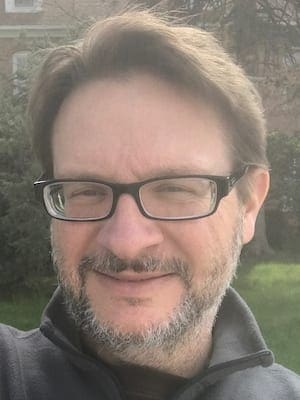President Bush has invoked God to explain his warfare, according to Robert Parham on EthicsDaily.com. It appears, then, that the tragedy occurring on the world stage at the moment is being directed by the Almighty, and Bush sees America as the protagonist: the hero.
Why Parham thinks as much is based on a New York Times essay by David Brooks. In that essay, Brooks writes about the president’s staunch belief that “a gift of [the] Almighty to all is freedom,” and that “leaders have the power to change societies. Even in a place as chaotic as Iraq, good leadership makes all the difference.”
Many might question whether a Christian ethicist should offer political comment in this situation, but the door has been opened for it. Not only has the president authoritatively entered into matters of religious faith, but he has involved all Americans in the process as well.
It is no secret that Bush–like Americans since Woodrow Wilson, who justified the U.S. entrance into World War I as “making the world safe for democracy”–views America’s purpose in terms of the Big Idea: liberty.
Hence, Iraq is a war to deliver freedom to the Iraqis. It is God’s gift of freedom wrapped up in an Abrams tank gift box. Interestingly, as Parham points out, the American people were originally told the Iraq war came about for less ideological and more substantial reasons.
“Commander-in-chief” apparently applies to the truth, as well. If Bush believes, as Brooks states, that history is moving towards democracy, then our current course is off track. Does democracy not exist when the elected leadership accountably acts upon the wishes of the people, who are in turn served honestly by that leader?
To the contrary, Bush has jeopardized history’s movement toward democracy–if that really is the destination of history (Christians might have something to say here)–by a sleight of hand: changing the conventions of democracy. He has rendered impotent the rule of law, redefined representative power and destroyed the republican virtue of transparency of government.
And now we understand the rationale behind the self-appointed hero, though he claims that history brought this moment to his doorstep. The commander-in-chief subscribes to a complex political theology that must be understood for what it really is: the backbone of a dictatorial executive, or the divine right of a popularly elected (or not) king.
Bush’s political theology is worrisome and outright dangerous on several levels.
First, he has indicated that the buck stops with God and not himself. He has tacitly removed himself from accountability for the humanitarian crisis precipitated by U.S. militarism, instead implying his actions are acts of compliance to God’s will. When he told the nation on March 17, 2003, that this is not a “question of authority, but this is a question of will,” who knew the depth of his perspective?
Simultaneously he has removed responsibility for the tragedy from the shoulders of American citizens themselves. This is not a new move, just framed differently, for he has repeatedly assured America that those on the side of freedom are never wrong. “No act of ours invited the rage of the killers,” he said at a 2001 National Endowment for Democracy event.
Although our history in the Middle East might not provide us comfort, with God on our side we escape having to look the mothers of U.S. casualties in the eyes. Instead, we comfort them with, “We support the troops!” and “The world is safer for democracy!”
Second, Bush has put into practice the political theology–yes, the political theology–of one of the most brilliant Nazi supporters, Carl Schmitt. Though the president shares little personal qualities with the man (and I strongly emphasize this point), their views of political power are similar.
Schmitt taught that all states, democracies included, must possess an understanding of sovereignty whereby the political leader has not only the responsibility of administering national emergencies, but also the absolute authority to decide what the state of emergency is. The president worked tirelessly to construct the present state of emergency, and his cabinet and staff do the same even as this article is written.
Schmitt called this the “state of exception.” It confers upon the political leader the moment by which he or she is obligated to step outside of the rule of law for averred public interest. For him, the political office of state head resembles the divine office of sovereign God in that they both are absolute in their domain.
Bush is not so far off from this view. And as long as he locates the ultimate reasons for his “state of exception” in God, he establishes his authority as irreproachable.
Third, as Parham pointed out, Bush has made the United States God’s personal vehicle for justice, in spite of the millions of Christian voices who say otherwise. God–the end of the line authority for actions for freedom–has met Bush–the end of the line authority for American security–in a secret room and locked the door to other voices of political and theological decision.
What is the danger? Is not America more secure? Is not the world getting safer for democracy, thanks to Bush and God?
Unfortunately, American Christians—and predominantly Evangelical Christians—support Bush’s ‘justification by faith’. They are comforted by the theological buck-passing. Meanwhile, hundreds of thousands of ‘would-be democrats’ have died in Iraq.
Bush is not alone complicit. The American people are, as well, from the legislators who selfishly signed on to the war despite knowledge of Bush’s political theology, to the taxpayers like me living life as usual, watching my tax dollars–nationally to the amount of over $400 billion–support an unjust, sinful and absolutely avoidable war.
I have contributed to the deaths of several hundred thousand people in this war alone and cannot be guaranteed a democratic payoff because God is not the guarantor of this war. Not now, not in 2003, and not in the future. Who shall I hold accountable?
Andy Watts is an assistant professor of Christian ethics at Belmont University.

